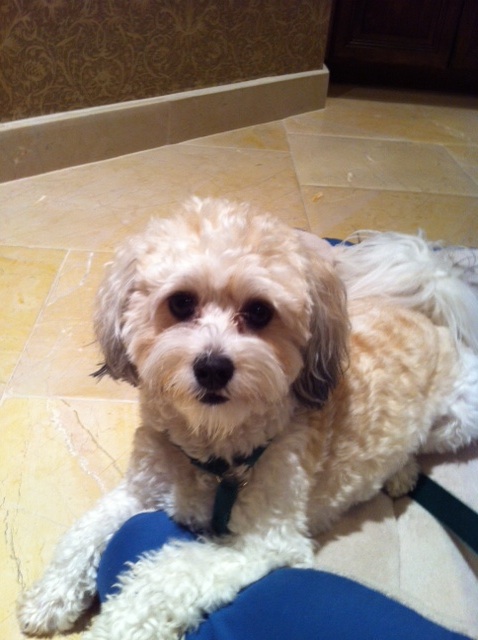Gina blinked twice and did a double take. The neighbor's new dog looked just like Fluffy. But, of course it wasn't Fluffy. Gina fought to hold back tears. Her beloved poodle, Fluffy had died six months ago after a protracted illness, and Gina had been heartsick ever since. She couldn't stop crying, and had lost her zest for so many of the activities she'd previously enjoyed. Her husband Phil, had been just as upset about losing Fluffy at first, but he'd bounced back a lot quicker. Lately, it seemed as if Phil was becoming increasingly more frustrated with her. He was too diplomatic to say: "Enough already," but everything about his demeanor and tone of voice implied that he believed it was about time she let go of the sadness. He wanted to enjoy himself, and Gina's somber mood was dragging him down. Gina and Phil had no children. When she told others that Fluffy had been her beloved child, she knew they just didn't understand. She knew they were thinking: "How can you equate feelings for an animal with the love of a child?" One acquaintance had seemed almost belligerent when Gina had confided how much she missed Fluffy. "Come on, Gina. It's just a dog. But, then again, I guess if you've never had children of your own, you might equate the two." It took every bit of restraint for Gina to keep from smacking her. Gina had eventually stopped talking about Fluffy to some of her girlfriends because of reactions like this. If others were becoming exasperated with her, she didn't care. Fluffy had been her baby, and she missed him terribly.
For those of us who are NOT animal lovers, please indulge a discussion that will hopefully speak to the hearts of the folks who've been smitten by their four-legged friends.
When an individual forges an intense bond with a beloved pet, the passing of this creature may be an excruciating loss. Those of us who've never established this level of connection with animals may not be able to fathom this pain. We may be genuinely baffled by the intense grief reactions shown and may truly believe: "It's just an animal after all." To imply that one should move on, and not grieve, may unintentionally communicate a callous insensitivity to another's loss -- a loss that can be quite real, and quite deep.
Some of us have had very limited or compromised social interactions in our every day lives. We may have had hurtful or disappointing relationships with others, or discouraging experiences or setbacks. However, with our pets, we may feel free to show an uninhibited, playful side of ourselves we're too intimidated to display anywhere else. And, we may actually like this side of ourselves.
Coming home daily to a pet that accepts our flaws and loves us unconditionally may be a source of enormous comfort and joy. And, for those of us who have not have children of our own (whether by choice or circumstance) our pets may have filled an emotional void, offering a fulfilling sense of family connection.
All of us handle grief in a very unique and individual way. We may not fully understand what we are feeling, or even comprehend why we are being impacted the way we are.
The level of grief we experience will often be determined by our stage of life and particular life circumstances, the longevity and breadth of the bond with the animal, and the particulars of this loss. And, of course, our history of emotional bonding and the quality of other relationships in our lives will be a determining factor. Some of us will find that intense feelings can be triggered even years after the loss; upon the sighting an animal on the street, or an anniversary date that passes.
We may feel a bit defensive or embarrassed that we're struggling the way we do. When those around us minimize the loss or imply it's inappropriate to react so strongly to the loss of a non-human, we may become hurt or highly offended, and our grieving process may be hampered.
Sometimes our family members are at a loss on how to be supportive to us. They may feel awkward and frustrated, and desperate for life to return to the way it was. They don't always understand that they can be show tremendous compassion, even when saying nothing; just by squeezing our hands and communicating patient acceptance.
We should never underestimate the powerful draw of a bond with a being that loves us unconditionally, asking very little in return. Losing this comfort and source of joy can be incomprehensible.
-- Linda Lipshutz, M. S., LCSW, is a psychotherapist serving individuals, couples and families. A South Florida resident, she holds degrees from Cornell and Columbia and trained at the Ackerman Institute for Family Therapy in Manhattan. She can be reached at 561-630-2827, online at www.palmbeachfamilytherapy.com, or on Twitter @LindaLipshutz.

Have you seen Otis?
Friends: I was finalizing the last details of this article when I received notice that my beloved dog, Otis, a 10-pound male Havanese, white with tan markings, ran away while under the care of a trusted pet sitter. We have been searching frantically for him since August 19. He was last seen at 13410 South Shore Boulevard in Wellington, Florida. I am appealing to anyone who may have seen Otis, and may have information about his whereabouts. There is a cash reward. Please call 561-630-2827 or email Bring.Otis.Home@gmail.com. I would be eternally grateful.